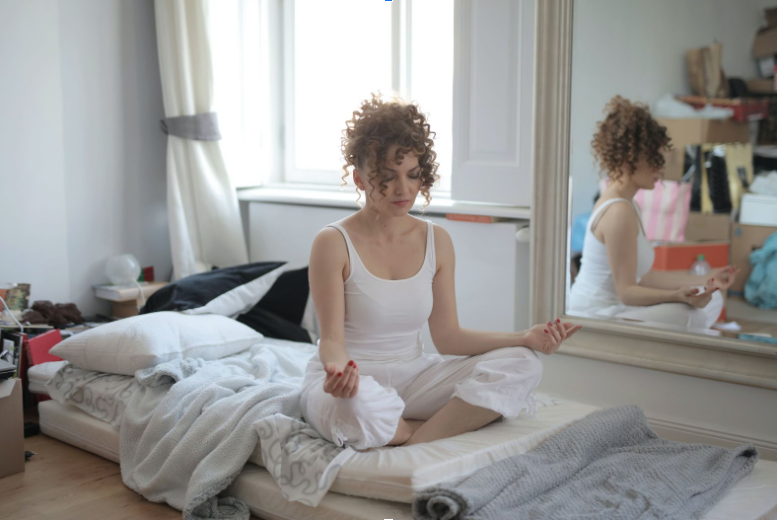Deep restful sleep has many similarities to meditation through the benefits they provide to the body and mind. However, there are also several differences. Sleep and meditation both have the ability to restore and revitalize the body and mind. Rest is essential to our physical, mental, and emotional health. While, cellular repair and stress processing happens during the sleep cycle.
Consistently getting a good night’s sleep improves happiness levels, fitness endurance, muscle mass, enhanced memory, and learning skills. Meditation can enhance vitality, improve memory, increase positive emotions, mental clarity and intelligence. 
There seems to be a lot of similarities between sleeping and meditation but sleep is meant to replenish your energy while meditation is designed to cancel out the stress that initially made you tired. It’s important to slowly incorporate meditation into your day, continue to sleep at a regular time, and allow your body to reset its natural sleep cycle.
The main difference between sleep and meditation is that during a meditation session we remain awake and alert. When you first begin to meditate and allow your body to fall into a fully relaxed state you might start nodding off because your body is correlating relaxing with sleep. While we are asleep our bodies fall into non-alertness. That is why in the morning or after a nap we may feel groggy and dull. Conversely, after a meditation session we can feel revitalized, energized, and clear. Meditation also produces euphoric hormones, giving people a “runner’s high.”
Another clear difference between meditation and sleep is the breath. 
During sleep, our breathing is slower and deeper but the oxygen intake does not decrease. Whereas in a deep meditative state the mind is quiet and the body no longer needs as much oxygen to function and the rate of breath will diminish dramatically. Expert meditators have the ability to slow their physiology down to a level where their heartbeat stops for a few seconds.
Meditation can be more restful than sleep. In 2010 a study conducted by the University of Kentucky, researchers discovered that novice meditators did better on a mental performance test after 40 minutes of meditating rather than after a 40-minute nap. The second part of their study looked at the amount of sleep experienced meditators got per night compared to non-meditators. Meditators slept on average 2.6 hours less than the non-meditating group. The level of rest a body receives during meditation can be two to five times deeper than what it receives at night, it is more relaxing and therapeutic than sleep.
Mutually Beneficial
This does not mean meditation and sleep are interchangeable but they are mutually beneficial. Sleep quality is more important than sleep quantity and often times people are not getting quality sleep. Our minds continue to race even after we have gone to sleep, especially during a stressful period in time. Being well-rested from a good night’s sleep can reduce the chances of falling asleep during meditation.
Meditation allows us to connect with inner peace and joy that can seem unattainable throughout the day. 
Being more connected to our internal dialogue and the external world, we can enhance our ability to navigate our lives more skillfully.
Ravi Shankar, a meditation teacher, explains:
“Wakefulness and sleep are like sunrise and darkness, while dreams are like the twilight in between. Meditation is like the flight to outer space, where there is no sunset, no sunrise—nothing!”
Sleep and meditation are beneficial to our physical, mental, and emotional health and well-being. Helping to revitalize the mind and body by reducing stress.
Regular meditation practice can enhance the quality of our sleep, while quality sleep helps a more productive meditation.
https://eocinstitute.org/meditation/require-less-sleep-with-meditation-460/
https://www.lispine.com/blog/do-you-need-less-sleep-when-you-meditate/32

